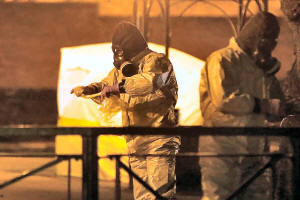|
Britain and Russia brace for showdown
over nerve attack on ex-spy
 Send a link to a friend
Send a link to a friend
 [March 14, 2018]
By Guy Faulconbridge and Michael Holden [March 14, 2018]
By Guy Faulconbridge and Michael Holden
LONDON (Reuters) - Britain braced for a
showdown with Russia on Wednesday after a midnight deadline set by Prime
Minister Theresa May expired without an explanation from Moscow about
how a Soviet-era nerve toxin was used to strike down a former Russian
double agent.
The United States, European Union and NATO voiced support for Britain
after May said it was "highly likely" that Russia was behind the
poisoning of Sergei Skripal and his daughter with Novichok, a nerve
agent developed by the Soviet military.
Russia, which denied any involvement, said it was not responding to
May's ultimatum until it received samples of the nerve agent, in effect
challenging Britain to show what sanctions it would impose against
Russian interests.
"Moscow had nothing to do with what happened in Britain. It will not
accept any totally unfounded accusations directed against it and will
also not accept the language of ultimatums," Kremlin spokesman Dmitry
Peskov told reporters on Wednesday.
He said Russia remained open to cooperating with Britain in
investigating the poisoning, blaming the British authorities for
refusing to share information.

Russia's Interfax news agency reported the Russian embassy in London
planned to ask for consular access to Yulia Skripal, Sergei's daughter.
Britain's response to the expiry of the deadline and lack of explanation
from Moscow was expected to be announced by May in parliament later,
after she chaired a meeting of the National Security Council at her
Downing Street office in the morning.
London could call on Western allies for a coordinated response, freeze
the assets of Russian business leaders and officials, limit their access
to London's financial center, expel diplomats and even launch targeted
cyber attacks.
It may also cut back participation in the soccer World Cup, which Russia
is hosting in June and July.
Russia is due to hold a presidential election on Sunday in which
Vladimir Putin, himself a former KGB spy, is expected to coast to a
fourth term in the Kremlin. He was first installed as Kremlin chief by
Boris Yeltsin on the last day of 1999.
U.S. President Donald Trump told May by telephone Russia "must provide
unambiguous answers regarding how this chemical weapon, developed in
Russia, came to be used in the United Kingdom," the White House said.
The White House said Trump and May "agreed on the need for consequences
for those who use these heinous weapons in flagrant violation of
international norms."
A British readout of the conversation said, "President Trump said the US
was with the UK all the way."

"MILITARY-GRADE NERVE AGENT"
Skripal, 66, and his daughter Yulia, 33, were found slumped unconscious
on a bench outside a shopping center in the genteel southern English
city of Salisbury on March 4. They have been in a critical condition in
hospital ever since.
British scientists identified the poison as a military-grade nerve agent
from a group of chemicals known as Novichok, first developed in the
Soviet Union in the 1970s and 1980s.
[to top of second column]
|

Members of the emergency services wearing protective clothing work
near the bench where former Russian intelligence officer Sergei
Skripal and his daughter Yulia were found poisoned in Salisbury,
Britain, March 13, 2018. REUTERS/Henry Nicholls

May said either the Russian state had poisoned Skripal, a former
Russian military intelligence officer, or Russia had somehow lost
control of its chemical weapons. Putin said last year that it had
destroyed its last stockpiles of such weapons.
A Russian chemist who helped develop the nerve agent said only the
Russian government could have carried out the attack.
Vil Mirzayanov, 83, said he had no doubt that Putin was responsible,
given that Russia maintains tight control over its Novichok
stockpile and the agent is too complicated for a non-state actor to
have weaponized.
“The Kremlin all the time, like all criminals, denying - it doesn’t
mean anything,” said U.S.-based Mirzayanov, an exile.
Skripal betrayed dozens of Russian agents to Britain before being
arrested in Moscow and later jailed in 2006. He was freed under a
spy swap deal in 2010 and took refuge in Britain.
A British policeman who was also affected by the nerve agent is now
conscious in a serious but stable condition.
May said Russia had shown a pattern of aggression including the
annexation of Crimea and the murder of former KGB agent Alexander
Litvinenko, who died in 2006 after drinking green tea laced with
radioactive polonium-210.

A public inquiry found the killing of Litvinenko had probably been
approved by Putin and carried out by two Russians, one of them a
former KGB bodyguard who became a member of the Russian parliament.
Both denied responsibility, as did Moscow.
Counter-terrorism officers began investigating the death of another
Russian in Britain on Tuesday, although police said it was not
thought to be linked to the attack on the Skripals.
Nikolai Glushkov, 68, who was an associate of late tycoon Boris
Berezovsky, was found dead on Monday. Berezovsky was found dead in
March 2013 with a scarf tied around his neck in the bathroom of his
luxury mansion west of London.
(Reporting by Guy Faulconbridge and Michael HoldenAdditional
reporting by Polina Ivanova in Moscow, Writing by Estelle Shirbon,
Editing by William Maclean)
[© 2018 Thomson Reuters. All rights
reserved.]
Copyright 2018 Reuters. All rights reserved. This material may not be published,
broadcast, rewritten or redistributed.
Thompson Reuters is solely responsible for this content. |